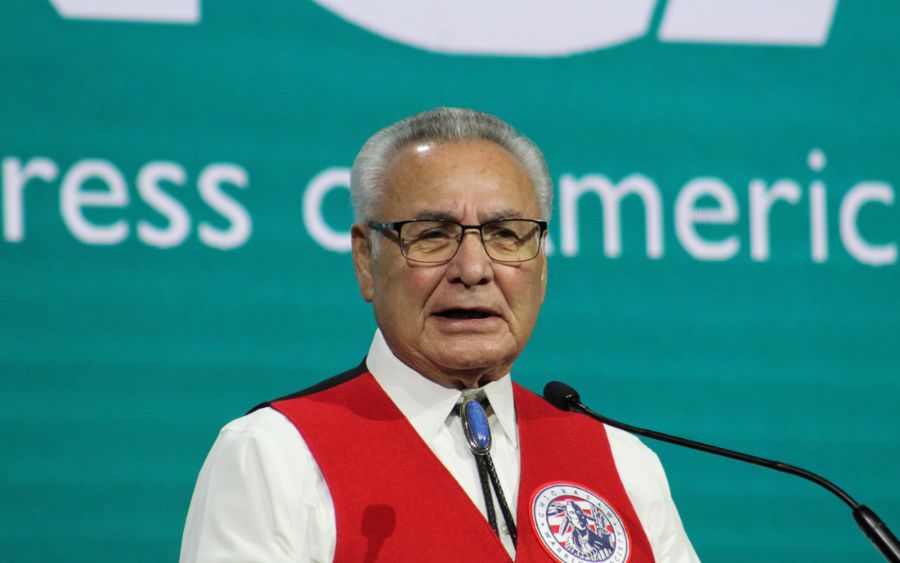
- Details
- By Shannon O'Loughlin
Guest Opinion. I am writing this as I leave the National Congress of American Indians 80th Annual Convention and Marketplace in New Orleans early, unable to stay to participate and network with fellow cultural sovereignty advocates to build up Native Country. As a national nonprofit leader for the Association on American Indian Affairs, the oldest nonprofit serving Native Country since 1922, like other Native nonprofit leaders, like our Native Nation leaders - like all of us (we're not special!), we live with the colonial legacy of genocide, assimilation, and boarding schools. Even today, we have to constantly prove we are valuable to society; constantly evoke our histories, traditions and wisdom to educate the mainstream that we are still here and hold ancient solutions to the problems of our world.
This takes an enormous toll on our individual and community health. That is why I am leaving NCAI early. I had a severe health scare caused by exhaustion and stress, despite my healthy and active lifestyle. But the emergency doctor told me to go home and rest, and live to fight another day.
But the stress hasn't left. As I write this, I am overwhelmed by emotion knowing that my relatives are fighting each other. I am a white presenting citizen of the Choctaw Nation of Oklahoma - also privileged to be a federally acknowledged tribal nation, granted certain gifts by the great white father.
But there are many Indigenous Peoples in the United States of Colonialism that are not so privileged. Their children continue to be forcibly removed from their families and adopted out, their ancestors buried in boarding school and asylum cemeteries, and their ancestors and sacred items stolen and in basements of museums and attics of collectors - just like those from federally recognized nations. But for the fact that some white guy somewhere in history made a unilateral decision to exclude some of us in his omnipotent effort to eliminate the "Indian problem," they may have been a part of our contemporary federally recognized privilege.
At NCAI, our relatives are voting on an extremely complicated matter of Indigeneity, of culture, of belonging that is no different than demanding a separate water fountain for whites and blacks. Even my own tribal nation believes that unrecognized nations must sit at the back of the bus - that they have no value, that some lives are not as important to protect as others though we have all faced the same horrible indignities by the one great nation whose privilege comes from our lands and our ancestors' bones.
My desire is that we all remember our shared histories of dispossession and do the work that the federal government and the colonizer-keepers in Native Country cannot do for us. How many times have our warriors told us that we must not divide and conquer ourselves? Walking around the NCAI exhibit floor and connecting with others it became obvious that there is so much good work being done - think of all we could accomplish if we put aside the capitalistic ideas of "mine not yours." This is the time to remember that our health and security is dependent on the health and security of ALL of us, because we are all connected and all related.
We each have a choice to pass on intergenerational healing, or continue the legacy of trauma instilled in us by our (non-Native and Native) colonizers. I hope that the members of NCAI can stand up to those that wish to tear us down - and that means those that claim Indigeneity where none exists, as well as those that wish to take a broad brush to wipe out state recognized Nations. There is a path forward that can heal us all, but we will need to clear our minds, eyes, voices and hearts and take responsibility for our relatives over our privilege. Until then, I will go home and rest and pray for health and healing.
(The Association on American Indian Affairs protects sovereignty, preserves culture, educates youth, including those from non-recognized Tribes, and builds capacity, since 1922 - before there was such a privilege of federal recognition.)
Shannon O'Loughlin (Choctaw) is the CEO and attorney of the Associatoin on American Indian Affairs.
Help us defend tribal sovereignty.
At Native News Online, our mission is rooted in telling the stories that strengthen sovereignty and uplift Indigenous voices — not just at year’s end, but every single day.
Because of your generosity last year, we were able to keep our reporters on the ground in tribal communities, at national gatherings and in the halls of Congress — covering the issues that matter most to Indian Country: sovereignty, culture, education, health and economic opportunity.
That support sustained us through a tough year in 2025. Now, as we look to the year ahead, we need your help right now to ensure warrior journalism remains strong — reporting that defends tribal sovereignty, amplifies Native truth, and holds power accountable.
 The stakes couldn't be higher. Your support keeps Native voices heard, Native stories told and Native sovereignty defended.
The stakes couldn't be higher. Your support keeps Native voices heard, Native stories told and Native sovereignty defended.
Stand with Warrior Journalism today.
Levi Rickert (Potawatomi), Editor & Publisher
